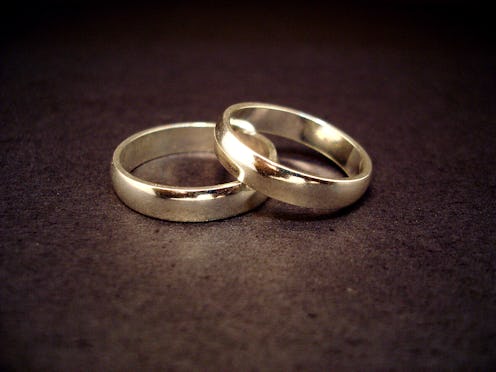Life
Feminism's Classist View of Marriage

In mainstream feminist discourse, marriage tends to get a bad rap. Often the idea of getting hitched (especially to a man) is equated with giving up one's personal freedom. But these views may in fact be severely lacking. As Emma Green in The Atlantic rightly points out, this is a very limited, classist view of the matter. For women living in or near poverty, marriage can be its own form of liberation, providing some much needed financial stability.
Obviously, it's up to every individual woman whether or not she gets married and to whom. Getting married won't automatically fix anyone's economic woes unless you're marrying Donald Trump. But then you have to be married to Donald Trump, so that has its own downsides. No, choosing not to marry is a valid choice for any woman no matter where she may fall on the socio-economic spectrum. But as Green observes, the choice looks very different depending where on that spectrum you find yourself.
Green writes that, "Taking a stand against patriarchy is much easier if you're well-educated, have a stable income." For such women, marriage is about "independence, lifestyle, and, at times, 'fighting the patriarchy.'" Whereas for "poor, uneducated women, especially those who have kids, the question of whether to get married looks a lot different." For such women, having a partner frees them from shouldering the burden of supporting themselves and possibly their children alone.
So is feminist discourse lacking in this regard? Well, from where I stand, yes. If feminism is to be meaningful, it cannot revolve around middle class white women and ignore the experiences of women who don't fit into these boxes. The fact is that marriage can be liberating for many women, assuming of course that their partner is able to provide the financial, emotional, and practical support they need.
Really, resisting or embracing marriage because of the effect it may have on a woman's independence is an odd idea anyway. Every marriage is different, after all. Every marriage has its upsides and its imperfections. And if someone gets married or doesn't, chances are they're thinking more about their own relationship and what they want from their own life than whether or not marriage itself is oppressive.
So maybe it's time mainstream feminism reframes the marriage question as a choice women have the right to make on their own terms — without feeling pressure either to conform because of a 1950s stereotype or to resist because of ideas about the patriarchy. Getting married or not ought to be about women choosing what's best for themselves. Because what could be more feminist than that?
Image: Wikipedia Commons